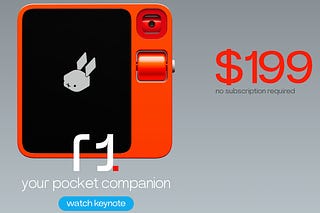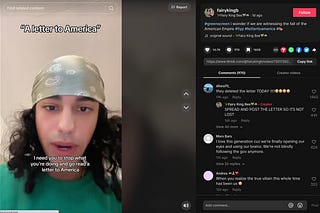

Discover more from Garbage Day
Meet William Yang, A Reporter From Taiwan Covering COVID, China, Hong Kong, And So Much More
"It feels like a privilege to be able to get out of my house whenever I want and be able to go do anything I plan to do."
Welcome to Extra Garbage Day! Every other week, I’ll be dropping a bonus Thursday issue just for paying subscribers. To start, these will be Q&As with interesting people I’ve been dying to interview. Let me know what you think.
I’m really excited about this week’s Extra Garbage Day. I’ve been following reporter William Yang for a few years now. His work has always been great, but in the last year, his Twitter feed has become a one-stop shop for what I think is the biggest story in the world right now: the interplay between COVID-19, the Hong Kong democracy movement, Taiwan, Chinese authoritarianism, and the future of digital freedom.
Yang is based in Taipei, Taiwan, and you may recognize him from a Garbage Day item from last week. Yang was one of the first reporters to notice that the World Health Organization’s Facebook account was not allowing users to post comments featuring the word “Taiwan”.
The WHO told The Guardian that it had been using a filter for the words “China” and “Taiwan” to deter “cyberattacks” from “online activists”.

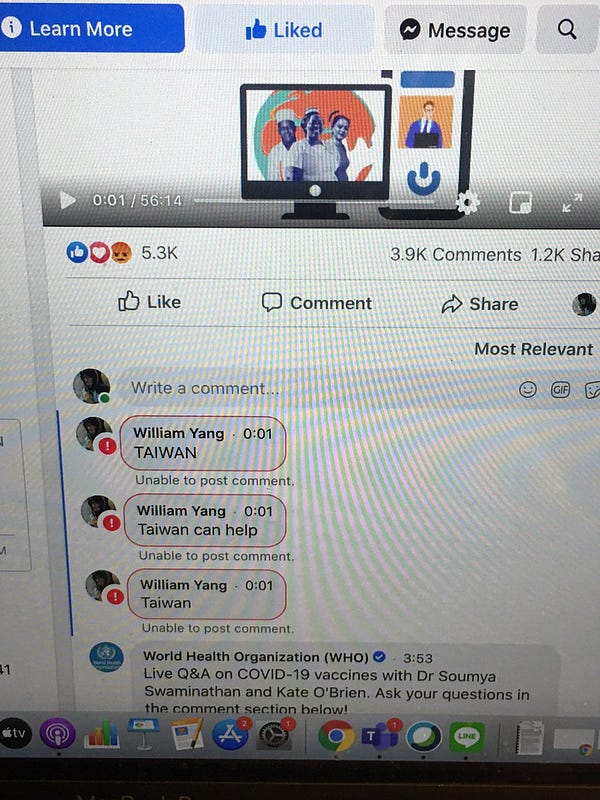
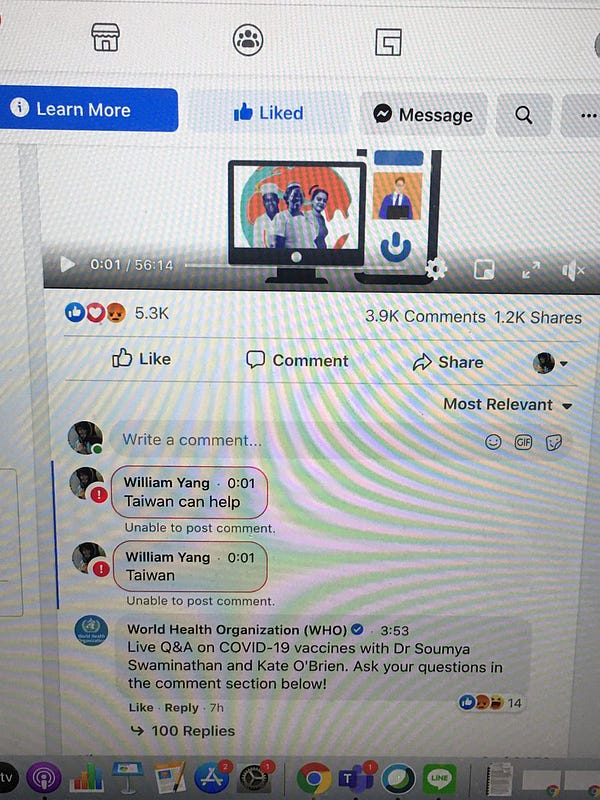
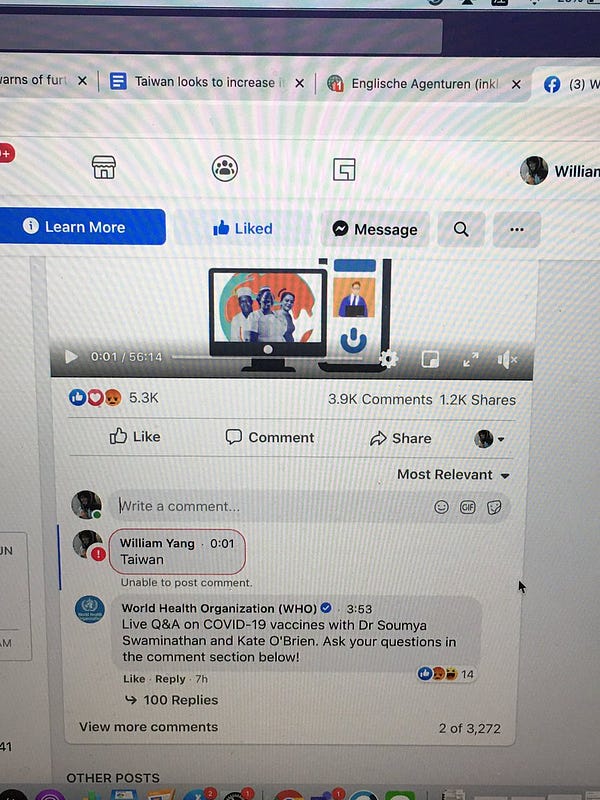
Taiwan has essentially eradicated COVID-19, one of the few countries in the world to do so. As of today, the country has reported 7 deaths due to COVID-19. Recently, the country was able to make it 200 days without any locally-transmitted cases of the coronavirus. They celebrated with a music festival.
The issue, though, is that Taiwan is not recognized by the World Health Organization — which only recognizes countries that are part of the United Nations. The WHO currently lumps Taiwanese COVID data with China’s. Taiwan’s government has tried to work with the WHO, but Beijing has said they could only participate if they acknowledge they are a Chinese province and not a sovereign nation. It’s a geopolitical mess and is absolutely hindering our global response to the pandemic. China is still blocking Taiwan’s WHO involvement as of this week.
Following Yang has made untangling the thorny intricacies of all of this a lot easier to understand. In our interview this week, I asked him about how he manages to tackle every angle of the China story, what he thinks our post-Trump/post-COVID world will look like, and, most importantly, what it’s like to live in a country effectively without coronavirus. God I wish I could go to concert. The following interview has been edited for clarity and pacing.
Can you tell me a bit about what your work was like before the pandemic and how it’s changed over the last year? It feels like you’ve become way more of a one-man band on Twitter, covering every angle of the China/Taiwan/pandemic beat.
Before the pandemic began, I mainly covered political and social news in China, Xinjiang, and Hong Kong. In the second half of 2019, my personal and professional life were basically occupied by the protests in Hong Kong. Then following the presidential election in Taiwan in early January, I began to come across posts on Chinese social media and Chinese Twitter users talking about a mysterious epidemic emerging from Wuhan. Since I have a few friends who live in Wuhan, I began staying in close contact with them. Quickly, things got really bad in Wuhan and the government decided to put the whole city in lockdown. Since I was able to stay in contact with my sources there, I began to share first-hand information on Twitter from the city after the lockdown and, quickly, my posts got picked up by many mainstream media outlets and some unexpected opportunities also came my way because of that.
I’ve pretty much stayed on the topic ever since, doing weekly TV appearances and radio talks while reporting about the different sides of the pandemic. It is extremely unfortunate regarding how the pandemic has completely altered the trajectory of 2020 for most people, but I guess in a way, my career got a rather visible boost because of my coverage of the situation in China during the early days of the outbreak.
For the uninitiated, how would you describe Taiwanese internet? And what is its relationship like to China’s internet?
Taiwan’s internet is a very free space where you see discussions about anything, but political discussions are probably one of the most popular topics that can often evolve into major news events. Since the internet is mostly occupied by the younger generation, its relationship with the Chinese internet has become a lot more antagonistic over the last few years. Especially as China continues to try to shut Taiwan out internationally. Taiwanese netizens have become very engaged in using online discussion or the power of the internet to counter China’s aggression against Taiwan. In a way, Taiwan’s internet at times has become a channel for Taiwanese people to frame and amplify their voices and identities.
Taiwan keeps going viral in the US for the country’s seemingly amazing COVID response. Most recently, people were going nuts over photos from the Ultra music festival. Does that reputation as the “one country to beat COVID” feel deserved?
The praise and positive attention that Taiwan has been getting in 2020 due to its success in containing the outbreak can certainly be felt among Taiwanese citizens, especially the younger generation. People generally feel proud of their Taiwanese identity, while most of the rest of the world is going through dramatic changes in terms of their every day life. The sense of community as “Taiwanese” people has also been forged by the positive international image for Taiwan.
It feels sort of maddening to see organizations like the WHO really not acknowledging Taiwan. Can you tell me a bit about the Facebook keyword ban you stumbled across last week?
I began to receive information from friends in the US at 6AM that day, telling me that it seemed like many of them had not been able to leave comments containing the word “Taiwan” under posts on WHO’s official Facebook page. Given the series of rather unbelievable dramas that the WHO has created over issues about Taiwan earlier this year, I couldn’t believe that they would actually dare to go this far by censoring their official Facebook page.
After some personal experimentation, I found that they had added keyword filters for words like “Taiwan,” “China,” and “Republic of China” under the livestream video for the World Health Assembly meeting. I confirmed with sources at Facebook about the specific features that would allow page admins to do that and also talked to experts in the field of freedom of expression on social media. Then I was sure that this was a case of politically-motivated censorship against Taiwan launched by the WHO and assumed that they had tried to prevent any comments related to Taiwan under that livestream. The inclusion of Taiwan was one of the thorny topics that the WHO was trying to avoid during the WHA.
It might be silly to ask, but what is it like being a reporter in Taiwan right now? From the outside, it feels like you’re in center of the world.
The biggest difference between now and before was that Taiwan used to be such an overlooked topic for most foreign news outlets around the world. But just this year alone, I have received requests from some of the most unexpected media outlets around the world. In a way, Taiwan’s experience in 2020 is like my own career trajectory this year, where the island benefited quite a lot due to the pandemic. Of course, it mainly comes from its success in containing the outbreak. I’d say the amount of opportunities for foreign correspondents in Taiwan has increased dramatically in 2020.
There’s so much speculation about what the world will look like once the dust settles from both Trump and COVID. I’d love to hear your thoughts on the future.
I think it will take a long time for people in the US and around the world to return to the old way of operation, meaning the abnormalities that came with the Trump administration and the pandemic have sort of forced most people to change their habits and routines tremendously. I envision a long period of “detoxing” for most people once the election drama and the pandemic are over.
And lastly, and this also might be kind of silly, also, but what does a COVID-free country feel like hahaha. I literally fantasize about crowds and socializing in public again, but it still feels so far away from where we are in the US.
Haha I love this question. Life in a COVID-free Taiwan is basically the same as before, except people, naturally, put on masks in crowded public places. Other than that, bars, restaurants, and department stores have never been forced to close since the beginning of the outbreak. It feels like a privilege to be able to get out of my house whenever I want and be able to go do anything I plan to do. Life is on a rather normal rhythm and the only thing that has been killing me, and most Taiwanese people, is probably the desire to start traveling internationally again.
Thank you for reading and supporting Garbage Day! If you’ve been forwarded this email, welcome! Definitely make sure you check out previous Extra Garbage Days:
@DigestTrump, a former Reddit mod hunting foreign disinformation operations
Talia Lavin, the author of Culture Warlords: My Journey Into the Dark Web of White Supremacy
And finally, as Yang said in his interview, Taiwan has often been overlooked when it comes to international news coverage. And I confess, I’m following news coming out of the country a lot more closely now than I was a year or two ago. But their elections last winter were very fun. Anti-Chinese unification incumbent president Tsai Ing-Wen won re-election and a bunch of exciting young candidates were also elected, including a cosplayer named Lai Pin-yu and a death metal singer named Freddy Lim. Here’s a campaign poster featuring Tsai in cat ears, Lai dressed like Neon Genesis Evangelion character Asuka Langley Soryu, and Lim dressed as Deadpool.
***Typos in this email aren’t on purpose, but sometimes they happen***
Subscribe to Garbage Day
A newsletter about having fun online.








